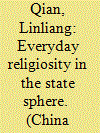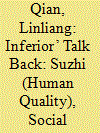| Srl | Item |
| 1 |
ID:
144075


|
|
|
|
|
| Summary/Abstract |
The religious sector in contemporary China is often portrayed as resisting or negotiating with an interventionist state in order to survive or protect its autonomy. This article, however, shows how it enters the state sphere and imbues the presumed state agents. By exploring folk beliefs and practices in a state-run orphanage (such as philanthropists’ activities, which they related to accumulation of karmic merits, childcare workers’ discourses, conduct associated with predestined relationships and baby ghosts, and institution officials’ preoccupation with palmistry, fortune telling and karmic retribution), and the impact of folk belief and practices on the working of the state apparatus, this study aims to enrich current scholarship by looking at state–religion interactions beyond the religious sphere and also reversing the image of Chinese religions as merely passive or reactive actors.
|
|
|
|
|
|
|
|
|
|
|
|
|
|
|
|
| 2 |
ID:
161517


|
|
|
|
|
| Summary/Abstract |
Rural migrants in Chinese cities are often stigmatized as ‘low-suzhi’ population and marginalized in urban social hierarchy. Existing scholarship has demonstrated how urbanities used suzhi discourse to justify their exploitation of migrants while maintaining class distinctions, and how migrants embraced urban lifestyles to improve their suzhi. Yet, this literature rarely addresses resistance of the ‘inferior’. By looking at the social interactions between migrant entrepreneurs and local residents in a city of southeastern China, this study shows that the emerging e-commerce economy has enabled many rural migrants to acquire financial, social, and cultural capital, which empower them to speak for themselves. Their rising wealth and self-representation as ‘high-suzhi’ entrepreneurs has reshaped their identity in the urban business world.
|
|
|
|
|
|
|
|
|
|
|
|
|
|
|
|